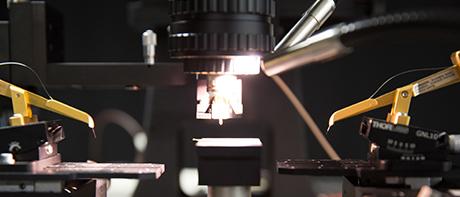Electrical Engineering
Program Overview
Offered through the Department of Electrical and Computer Engineering (ECE), the M.S. and Ph.D. programs in Electrical Engineering are designed to help students understand and apply the principles of electrical engineering to communications, power and energy, and micro- and nano-electronics. Faculty and students research in areas such as wireless/mobile communications, micro-electro-mechanical systems, magnetics, and remote sensing.
Students choose from five areas of focus:
- Applied electromagnetics
- Communications and networks
- Electrical power and energy
- Electronics, photonics, and MEMS (VLSI systems and microelectronics)
- Signal and image processing, systems and controls
Master of Science in Electrical Engineering (M.S.)
- Credit hours: 30
- Thesis options: thesis and non-thesis options are available
- Duration: Full-time (enrolled min. 9 credit hours per semester) or part-time (min. 3 credit hours per semester)
- Other requirements:
- Students are required to take at least one course in the department outside of his/her area of focus.
- Colloquium requirement: Students must fulfill this zero-credit course by attending five colloquium seminars, workshops or symposia sponsored by the department.
- More information on the department's website
Doctor of Philosophy in Electrical Engineering (Ph.D.)
- Credit hours (for those with a master's degree): 30
- Credit hours (for those without a master's degree): 54
- Duration: 4-6 years
- Other requirements:
- Seminar requirement: Students must present one departmental seminar, excluding the dissertation defense, prior to graduation.
- Colloquium requirement: Students must register for the zero-credit colloquium course and satisfy the requirement by attending five department-sponsored seminars, workshops, or symposia.
- More information on the department's website
Graduate Certificate in High-Performance Computing
The Department of Electrical and Computer Engineering offers a graduate certificate in High-Performance Computing. Students who successfully complete the certificate program have the option of applying these credits toward the full M.S. in Electrical Engineering.
Find more information on the department's website.
Admissions Requirements
To apply for any of these programs, please review the admissions requirements before submitting your application:
- M.S. admissions requirements
- Ph.D admissions requirements
- Certificate program admissions requirements
For any questions about the admissions process, contact the SEAS Office of Graduate Admissions at engineering gwu [dot] edu.
gwu [dot] edu.
More Information
For more information on graduate programs in Electrical Engineering at SEAS, sign up to receive emails with additional information or visit the website of the Department of Electrical and Computer Engineering.


